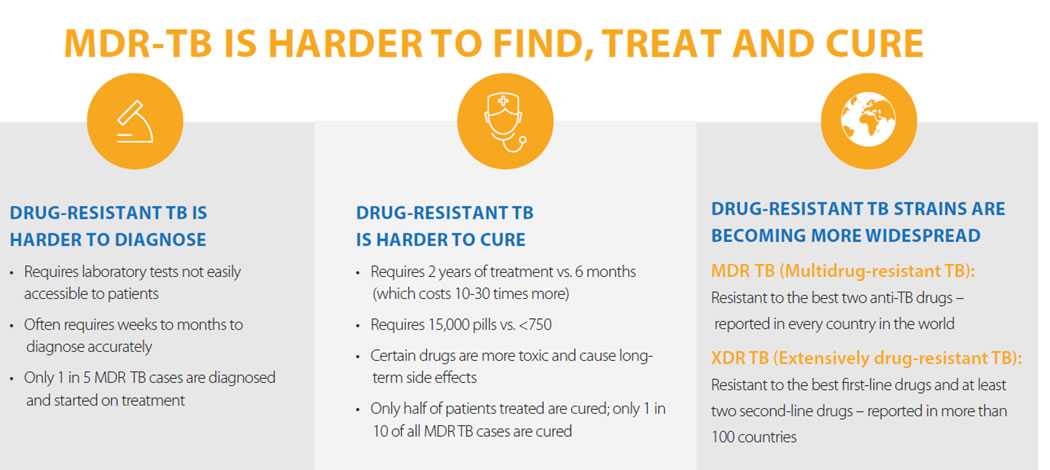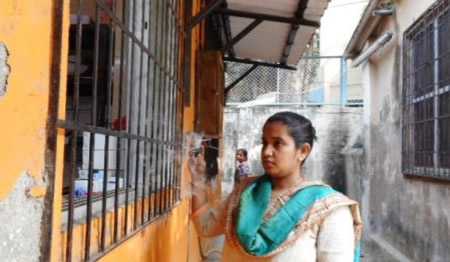CDC and Partners Tackle Drug-Resistant TB in India
Story Highlights
- Tuberculosis (TB) is the number one infectious disease killer worldwide. Unlike drug-resistant TB, TB is preventable, treatable, and curable. We must address TB both at home and abroad to ensure a safer, healthier America.
- Drug-resistant TB threatens our ability to treat and control TB. Drug-resistant forms of TB have spread to every country around the world.
- To protect Americans from antibiotic resistance threats, CDC is reinforcing international collaborations and capacities for antibiotic resistance prevention, surveillance, and infection control with countries worldwide.
- Mumbai, India is one of the highest burden municipalities for drug-resistant TB in the world. CDC is working to address key gaps in this serious and growing epidemic, including improving TB infection control, diagnostic and treatment services, and treatment adherence.
- With local experts, CDC helped establish an Airborne Infection Control Unit (AICU) in Mumbai in September 2016. The AICU helps healthcare facilities implement TB infection control best practices to reduce healthcare-associated transmission of drug-resistant TB. CDC provides ongoing training but the unit is run by local partners.
- In addition, CDC is working with partners in Mumbai to improve TB laboratory quality, TB treatment and adherence, and proficiency testing to improve treatment outcomes.
- By sharing its world-class scientific expertise, CDC can strengthen local capacity to quickly detect and treat the threat of drug-resistant TB and contain its spread.
Tuberculosis (TB) is the number one infectious disease killer worldwide but, unlike drug-resistant TB, it is preventable, treatable, and curable. Drug-resistant TB—when the bacteria that causes TB disease is able to avoid the effects of antibiotics—threatens our ability to treat and control the disease. In October 2016, the World Health Organization estimated [PDF -6.35 MB] that drug-resistant TB had risen to more than half a million cases worldwide. Stronger TB infection control and improved detection and treatment practices can help reduce rates of drug-resistant TB worldwide.

Because TB is an airborne disease that is transmitted from person to person, it knows no borders. We must address TB both at home and abroad to ensure a safer, healthier America. While TB can have a severe economic toll, efforts to end TB are one of the best investments for improving U.S. and global health, security, and economic development. Patients often face staggering costs when seeking TB diagnosis and treatment, which can put families in poverty and undermines economic gains and stability. Efforts to end TB are a best buy—reaping $43 return for every $1 invested.

CDC is Combating Drug-Resistant TB
To protect Americans from antibiotic resistance threats, like drug-resistant TB, CDC is reinforcing international collaborations and capacities for antibiotic resistance prevention, surveillance, and TB infection control with countries worldwide.
Transformative Investments
CDC’s AR Solutions Initiative is implementing several TB projects to reduce rates of drug-resistant TB worldwide:
- Conducting a one-year study to optimize treatment protocol using early bactericidal activity study methodology in India.
- Evaluating the use of smartphones and video to monitor patient treatment and ensure therapy is completed.
- Increasing global technology for testing and treating TB to stop it at its source.
- Working closely with more than 25 ministries of health to strengthen TB control efforts
CDC is working on the ground in 25 countries to find, cure, and prevent TB and protect Americans both here and abroad by:
- Improving access to better screening, contact tracing, and diagnostic tools to find missing TB cases.
- Evaluating better TB treatment regimens and improving access to care and treatment.
- Breaking the cycle of transmission by strengthening TB infection control, identifying hotspots to target screening efforts, and scaling-up treatment to prevent TB among vulnerable populations.
One example of these efforts can be seen in Mumbai, India, one of the highest burden municipalities for drug-resistant TB in the world. By working together in Mumbai to address key gaps in this serious and growing epidemic, like TB infection control and treatment compliance, CDC and its partners can help reduce drug-resistant TB rates and contain its spread.

An AICU team member using a smoke tube to determine direction of flow of air in a health facility while conducting AIC assessments.
Improving TB Infection Control to Combat Drug-Resistant TB
In September 2016, the Airborne Infection Control Unit (AICU) in Mumbai was officially stood up by CDC with the Mumbai Municipal Corporation and India’s national TB program. The AICU addresses key gaps in seven high burden districts in Mumbai by evaluating key TB infection control gaps and implementing simple, rigorous interventions to decrease TB transmission in healthcare facilities. Simple steps—like ensuring appropriate triage for coughing patients and patients with confirmed TB, increasing airflow in waiting areas or moving them to sheltered spaces outdoors, and improving use of protective gear among healthcare workers—can reduce TB infections among patients and healthcare workers and improve working conditions. As of March 2017, the AICU has assessed and recommended improvements in 12 facilities.
Improving Treatment Adherence to Combat Drug-Resistant TB
Treating and curing drug-resistant TB is complicated and up to 30% of drug-resistant TB patients are lost to follow-up (do not complete treatment for a variety of reasons).
CDC and Science Health Allied Research Education (SHARE) are collaborating on the Strengthening TB Action and Response (STAR) project to build institutional capacity to improve drug-resistant TB treatment and adherence in Mumbai, as well as improve TB laboratory quality, airborne infection control, and healthcare worker surveillance.
To ensure that patients receive and complete the treatment they need, the STAR project has successfully registered 295 multi-drug-resistant TB patients, 21 extensively drug-resistant TB patients, and 305 caregivers in treatment adherence counseling services. The STAR project teams have made 270 home visits for follow-up counseling and retrieved seven patients whose treatment was previously interrupted.
Improving Lab Diagnostics & Treatment Services to Combat Drug-Resistant TB
Consistent access to sophisticated diagnostics and high-quality treatment varies in Mumbai and can come at a direct cost to the patient. These inconsistencies can lead to uneven patient care, under-diagnosis, and missed cases—all contributing to potential TB spread.
Each year, the private sector diagnoses more than half of Mumbai’s estimated 50,000 TB cases. Engaging the private sector in Mumbai is essential to avoid these inconsistencies and ensure patients can access quality diagnosis and treatment.
CDC is working with both the public sector (through the Mumbai Municipal Corporation) and the private sector (through Private Provider Interface Agency at PATH) to improve access to cultures, drug susceptibility testing (DST), and DST-based treatment to improve diagnosis and treatment of drug-resistant TB.
Finally, CDC is working to improve lab quality by training India’s National TB Institute microbiologists on proficiency testing. Using proficiency testing panels to measure drug susceptibility (if a bacteria will or won’t be killed or slowed down by a drug) helps facilities rapidly implement new national guidelines and can improve individualized drug-resistant TB treatment and outcomes. By sharing its world-class scientific expertise, CDC can strengthen local capacity to quickly detect and treat the threat of drug-resistant TB and contain its spread.
Learn more:
- Page last reviewed: March 27, 2017
- Page last updated: March 27, 2017
- Content source:


 ShareCompartir
ShareCompartir